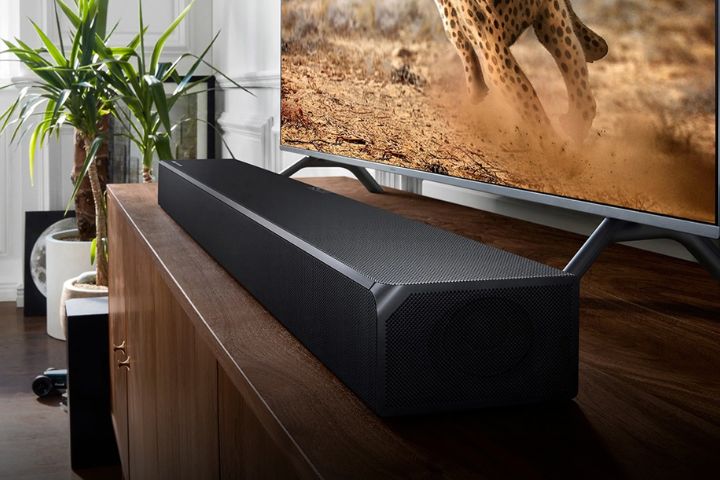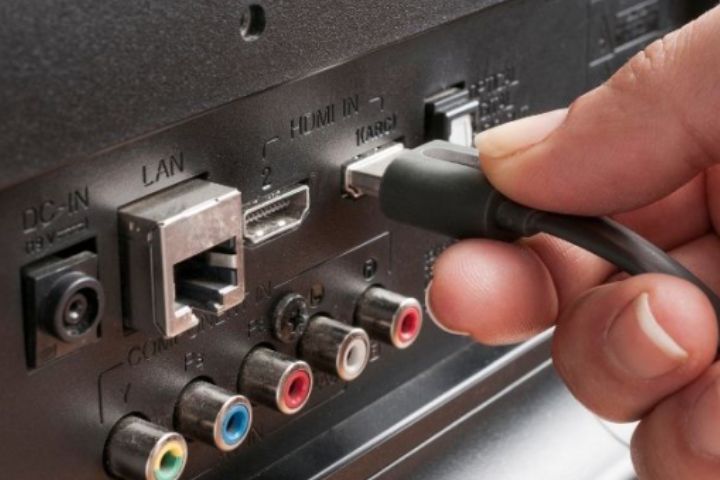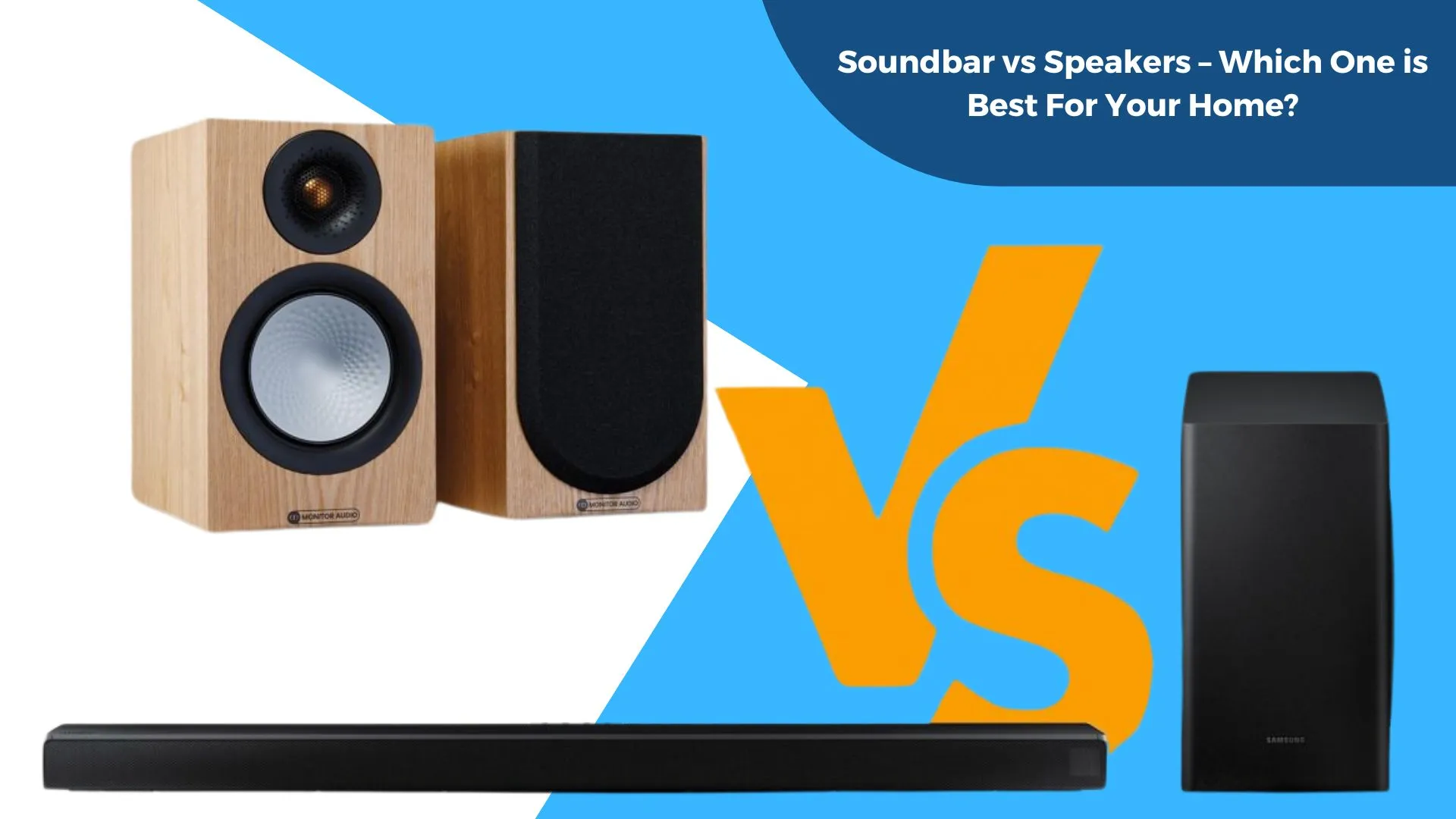When it comes to enhancing the audio experience of your television, between a Soundbar vs Speakers is a critical decision. Soundbars are a sleek, compact option designed to match the simplicity and aesthetic of modern flat-screen TVs, offering a fuss-free installation and a streamlined look. They often come with built-in amplifiers and can range from basic models that significantly improve on your TV’s internal speakers to high-end versions that deliver a rich, room-filling sound.
On the other hand, traditional speakers, as part of a more extensive sound system, typically provide a more immersive audio experience. Whether it’s a traditional stereo pair or a surround sound setup, separate speakers can offer superior sound quality, with the potential for a more authentic and enveloping soundstage. However, this audio quality comes at the cost of a more complex setup that requires an AV receiver and more space around your TV. That is why you will have to be sure about what size sound bar for 65 inch TV or what size sound bar for 55 inch TV you would need.
Key Takeaways
- Soundbars offer a stylish and simple audio upgrade from built-in TV speakers.
- Traditional speakers deliver a more authentic and enveloping soundstage.
- Setup and space considerations vary significantly between soundbars and speakers.
Defining Soundbars and Speakers
Soundbars and speakers serve a fundamental role in enhancing audio experiences in various settings. Soundbars are sleek, compact units containing multiple speaker channels. They are designed to sit below or above a television set or be mounted on a wall. Soundbars generally encapsulate an array of speakers in one elongated enclosure, facilitating improved audio quality without the complexity of a full speaker system.
Advantages of Soundbars:
The battle between soundbar vs speakers is an ongoing on. Soundbars and speakers serve a fundamental role in enhancing audio experiences in various settings. Soundbars are sleek, compact units containing multiple speaker channels. They are designed to sit below or above a television set or be mounted on a wall. Soundbars generally encapsulate an array of speakers in one elongated enclosure, facilitating improved audio quality without the complexity of a full speaker system.
Differences in Speaker Systems:
Each type of speaker serves distinct purposes and caters to different preferences regarding audio quality, spatial requirements, and aesthetics. While soundbars offer convenience and modernity, traditional speakers provide versatility and can deliver a more dynamic soundstage. If one dives into details at Best Soundbars In 2024, it’s clear that soundbars are favored for their space efficiency and ease of use. In the realm of traditional speakers, choices range from those that are part of a complex home theater setup, which can offer superior sound distribution. The right choice depends on one’s unique needs, space, and personal taste in audio.
Sound Quality Considerations

When comparing soundbars and speakers, one must assess audio clarity and depth, surround sound capabilities, and volume and power to determine which best suits their needs.
Audio Clarity and Depth
Soundbars provide a convenient, space-saving audio solution with improving quality but may lack the depth of separate speakers. For instance, traditional speakers often offer richer, more nuanced sound that exposes fine details within music and audio tracks.
Surround Sound Capabilities
Surround sound systems are unrivaled in creating an immersive audio environment. While a soundbar can improve your TV’s audio, a multi-speaker setup delivers audio from multiple directions, enveloping the listener and enhancing the realism of the experience.
Volume and Power
Speakers typically have a higher capacity for volume and power handling, providing a dynamic range that soundbars may struggle to match. This allows standalone speaker systems to fill a room with robust sound without distortion, even at high volumes.
Design and Aesthetics

In the debate between soundbars and speakers, design and aesthetics play a significant role in user choice. This section addresses how each option fits with different spatial and visual demands.
Size and Space Requirements
Soundbars offer a sleek and compact form factor. They are typically designed to be unobtrusive, requiring minimal space. Many models are slender enough to fit directly beneath a TV or can be wall-mounted. This makes soundbars an attractive option for those with limited space. On the other hand, traditional speakers vary widely in size, from small bookshelf models to large floor-standing units. A user must consider room size and layout when opting for speakers to ensure there’s adequate space not just for placement but also for optimal sound distribution.
Visual Integration with Home Decor
Soundbars are often praised for their ability to integrate seamlessly into a variety of decors. Their modern design, characterized by clean lines and simplicity, tends to match well with the current aesthetics of flat-screen TVs and contemporary interiors. Speakers, although more challenging to integrate due to their size and number, offer a range of styles and finishes that can complement or become a statement piece in a home. When considering visual harmony, one should take into account the color, materials, and design elements of the speakers to ensure they enhance the overall decor.
Connectivity and Compatibility

When considering a sound system for your home, how it connects to your devices and its compatibility are crucial factors. Both soundbars and speakers offer a range of options, each catering to different user needs.
Wireless Connectivity Options
Modern soundbars typically come with Bluetooth or Wi-Fi capabilities, allowing for wireless streaming of audio content. Certain models, as discussed on SoundscapeHQ, might also support advanced wireless protocols like Apple AirPlay or Google Cast. In contrast, wireless speakers can use similar technologies but also may employ dedicated wireless systems that offer high-resolution audio streaming without standard Bluetooth compression.
Compatibility with Other Devices
The compatibility of a sound system can dramatically affect user experience. Soundbars often provide a simple connection to a TV using HDMI ARC or optical cables. For example, an HDMI connection, as noted in one available guide, is advantageous as it supports audio and video signals, making setup and use quite straightforward. Additionally, soundbars are designed to work seamlessly with various TV brands. Speakers, however, may require a more complicated setup, it also have a long lifespan which makes your investment worth it. Involving receivers and amplifiers to manage the connection to different devices, ranging from TVs to gaming consoles and mobile devices.
Frequently Asked Questions
Choosing the right audio system for your entertainment setup can significantly impact your listening experience. This section addresses common inquiries about the functionality and suitability of soundbars and traditional speakers across various scenarios.
What are the advantages of using a soundbar over traditional speakers for a TV setup?
A soundbar offers a sleek design and simplicity in installation and use, often requiring minimal space and wiring. They are ideal for compact spaces and can significantly improve upon the audio output of built-in TV speakers with a single unit.
How do soundbars compare to full speaker systems for enhancing home theater audio?
Soundbars can provide a substantial upgrade from TV speakers, offering a clean and unobtrusive setup. However, full speaker systems generally yield superior audio quality, creating an immersive experience with a broader sound stage and directional sound that a soundbar might not match.
Can a soundbar serve as a complete replacement for a surround sound system?
Although a soundbar can mimic surround sound through advanced audio processing, it may not replicate the depth and immersion created by a true surround sound system with multiple speakers placed throughout the room.
Are soundbars or traditional speakers more suitable for a PC gaming setup?
Traditional speakers offer customizable audio setups for gaming, potentially providing a richer sound experience. However, for those dealing with limited space or preferring a minimalist setup, soundbars are a practical alternative that still improves upon basic computer speakers.
What benefits do bookshelf speakers offer compared to soundbars for a home audio experience?
Bookshelf speakers can be part of a versatile audio system, offering superior sound quality with the flexibility to upgrade. Unlike a soundbar, they can be paired with other components to match the listener’s preferences and generally offer a more authentic stereo experience.
How do sound quality and setup complexity differ between soundbars and Bluetooth speakers?
Soundbars generally provide better sound quality and more features compared to Bluetooth speakers, which are primarily designed for portability and convenience. A soundbar integrates easily into a home theater setup with a one-cable connection whereas Bluetooth speakers may have a less straightforward setup for TV Audio.

